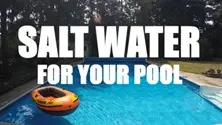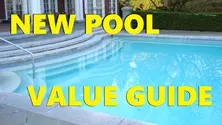Flexible PVC Pipe For Pools
SwimmingPoolSteve.com is user-supported. In order to keep this resource about pools and spas available for free to all readers I earn commissions for purchases made through links on this page. For more information see the full disclaimer page.

Is using flexible PVC or "flex pipe" a valid option for plumbing your swimming pool? You would not need to research this question very much before you discovered that the people with opinions on this subject are loud and quick to give you advice. But is this good advice that you are getting? It might be but depending on where you are located you could end up making a decision about your plumbing materials that comes back to haunt you. Pool owners with extensive leaks buried in their system would most likely trade for an actual poltergeist instead of their leaking pool.
Does this mean that flex PVC is bad and if you use it your pool will leak? Not necessarily. In some areas flexible PVC use outnumbers any other option at 100:1 which might lead a lot of people to ask if flex PVC is so bad why it is used more than any other plumbing material in some areas? The answer, in short, is that swimming pools are dynamic, there are many different kinds of pools and different ways to build them, but more importantly there are different geographic areas which affect what building materials and which construction methods should be used. As with pretty much everything else in the pool industry there are no straight, black or white answers, only long technical considerations that you must apply versus your own priorities for your pool.

Is rigid PVC better than flexible PVC? - Here is a question that can get a straight answer. Yes, definitively rigid PVC is superior to flexible PVC in almost every metric in which you could attempt to compare the two. That sounds a lot like a final answer as to what to use to plumb your pool and for many people it is. They hear that rigid is better in every way and they use this to install their pool. In a perfect world of apples to apples comparisons rigid PVC beats the heck out of flex PVC. However there is not yet enough information available to make a final decision.
Advantages of rigid PVC pipe - There are a number of advantages of rigid PVC pipe starting with the inside surface is smooth and free of striations which can have a detrimental affect of the resistance to flow and flow rates. Rigid PVC has a very high operating pressure rating (and burst pressure rating) which is far, far higher than what many people believe. Using schedule 40 which is the standard thickness used for rigid PVC plumbing systems, 1.5" rigid PVC has a maximum operating pressure of 198 PSI and a burst rating of up to five times this number. With 2" rigid PVC these numbers are 166 PSI for maximum operating pressure. Of course pool systems would never operate this high, only up to 30 PSI, but it gives you an idea of how robust these pipes are. Solvent welded pipes are extremely reliable and also can withstand similar pressures when connected properly. It is also worth noting that rigid PVC also comes in a thicker wall variety, schedule 80 which is suitable for even higher pressures. The thinner walled variety of rigid PVC is schedule 20 which is often used for conduits or for central vacuum systems in houses. Schedule 20 should never be used on any swimming pool or spa system.
Advantages of flexible PVC pipe - None. Just kidding. But I know a lot of pool professionals that would answer that question exactly like that. Flexible PVC does have some advantages that even the haters would agree about. For example, if you only had a car and no truck but you needed to pick up a few hundred feet of pipe...well the flex PVC sure would be a lot easier to deal with by tossing a few rolls into the trunk, a few in the back seat and maybe even one neatly seatbelted into the passenger seat of your car. If you are trying to move a few hundred feet of 10' sticks of rigid PVC that will be tough without a decent roof rack. If you are using builder lengths which are 20' with a bell end then good luck moving those with a car at all. So is that it, just easier to transport? No, flex PVC is also really easy to install as you simply roll it out into the trench. If you unroll instead of uncoil it will even stay where you put it for the most part instead of coiling up from memory. Flex pipe is also easier for novice plumbers to fit things together. Rigid pipe has a certain paint-yourself-into-a-corner aspect to it where you need to be able to plan ahead for how the last connections will be made. Flex pipe allows for a certain amount of fudge factor with tight connections. Finally, the main reason why flex is actually used, is simply that it is more shatter resistant in cold climate areas. The ability to resist freezing temperatures without shattering as well as being able to move somewhat along with heaving ground from freeze and thaw conditions is what defines the usefulness of flexible PVC.
Is Flex PVC Any Good?

Let's take a step back here for a moment and review what this information means. My professional reputation is at risk of being tarnished because I just said a bunch of nice stuff about flex pipe. First I would like to clarify, if you live in an area that does not experience significant freezing temperatures in the winter then your pool should be entirely, 100% constructed using rigid PVC pipes. Rigid PVC is superior in every way that you can possibly measure, but if you live in a cold climate area the risk of rigid pipes shattering from forces like the point of a rock, or from movement of the ground during freeze and thaws becomes worryingly high.
A skilled builder might be able to protect rigid pipes in cold climate areas with concrete raceways, very deep trenches below the frost line, extensive bedding with aggregates like sand, vermiculite or self compacting, high-drainage aggregate like birdseye pea gravel. Certainly this will cost extra, take longer, require more experience and still results in elevated levels of risk which are potentially not there with flex pipe. Flex pipe does not shatter when cold, and it can generally absorb movement enough to not shear with movement of the frozen ground. This is not to say only flex pipe can do this but more so that it is pretty easy to to install flex in such a way that it will survive cold winters. It takes a lot more skill to install rigid pipe in such a way that it will survive cold winters with the same reliability.
Disadvantages of flexible PVC pipe - First of all flexible PVC is actually hose not pipe, which is an important distinction for those who care about such things, like myself. Remember when I told you that the maximum operating pressure of 1.5" rigid PVC was 198 PSI, well the maximum operating pressure for flexible PVC hose is a paltry 65 PSI. Flexible PVC also has striations in the pipe which are actually fairly detrimental to flow efficiency. You want laminar flow. This is the most efficient way to move water. When you introduce turbulence this represents inefficiency and a loss of laminar flow. Rigid PVC is smooth on the interior but flex pipe is not. Flexible PVC is also not as UV resistant as rigid PVC and this results in sun damage and early failure to flex PVC that is not protected from the sun. Finally the solvent welded connections with flex PVC are less sound than a rigid pipe welded to a rigid fitting. The flex pipe welded to a rigid fitting can break over time due to the pipe expanding and contracting with pump startup and pipe hammer. I have seen this failure many times in hot tubs where flex was used as it is easier than heating and bending rigid PVC. In hot tubs, especially the jet lines, there is too much pipe hammer and water flow which results in fitting failures over time even when fully encased within concrete! One final note is that flex pipe might be able to resist shattering better than rigid pipe in cold weather but a problem unique to flexible PVC is that it can crush flat from earth compaction or even from the suction of the pump itself in extreme cases. Also worth noting is that termites can damage flexible PVC from chewing through it. It is believed they do not target it as a food source but will eat through any flexible PVC between their nest and a food source they want to get to. Termite damage to flexible PVC is mostly regarded as an issue in hotter, drier climates where termites in general are far more plentiful. The water in the pipes itself can also be a target for these pests who can easily chew through and turn your plumbing lines into underground sprinklers!
In summary rigid PVC is the superior choice for plumbing of swimming pools. In areas where you do not have freeze and thaw cycles in the winter I do not believe there is a valid argument for anything other than rigid PVC both above and below ground. In areas with severe winters the line becomes blurred more easily and flex pipe becomes a safer choice for people who are not confident with their ability to use and protect rigid pipe properly. Flex pipe is not a guaranteed problem and in my area of Ontario Canada almost all swimming pools are plumbed entirely with flex. Service life for these pipes can easily meet and exceed 25 or 30 years, perhaps longer, which clearly shows that for some installations flex can be easy, forgiving and still have an impressively long service life.
Pool equipment pads on the other hand should always and only be installed with rigid pipe. Never use flex on an equipment pad. Rigid looks and functions so much better here and there is no concern for freezing temps shattering pipes when they are above grade and winterized. If you are interested in more information about PVC and flex PVC pressure ratings and burst ratings you can find more information in this article about pressure testing pools.
Top content from www.SwimmingPoolSteve.com
Pool and spa chemistry crash course
New pool owner guide
The Swimming Pool Steve blog
Have a question - ask Steve

Swimming Pool Steve is an award winning, second generation swimming pool specialist from Ontario Canada and one of the most trusted voices in the swimming pool industry. With over 20,000,000 views on the Swimming Pool Steve YouTube Channel, winner of the Pleatco Pool & Spa Industry Leadership award and author of hundreds of pool and spa articles both online and in print. Steve is committed to helping pool and spa owners as well as pool and spa industry workers learn more about the technical side of building, renovating, repairing and maintaining all types of swimming pools and spas. Follow Swimming Pool Steve on Facebook, Twitter and YouTube.
Paid PDF Books From Swimming Pool Steve
 Steve's Pool Survival Guide
Steve's Pool Survival Guide
The Swimming Pool Steve Pool Survival Guide is intended to help pool owners understand their pool and pool equipment better, understand water chemistry, water testing and chemical corrections to the water, troubleshoot the most common pool problems and have confidence in interacting and caring for their pool in the fastest possible frame of time. Also covers pool safety, things to avoid and how to operate your pool more efficiently.
 Salt Water Recommendations
Salt Water Recommendations
Are you considering upgrading to salt water in your pool? In this paid PDF Steve talks about which pools should avoid using salt water. Find out concerns about using salt in your pool but also the potential benefits of salt water. Finally hear which specific brand and model of salt chlorine generator Steve thinks is the best option currently available to pool owners and how to choose the right size salt system for your pool.
 New Pool Heater Buyer's Guide
New Pool Heater Buyer's Guide
In this guide Swimming Pool Steve will help you to better understand your heater options as well as which would be best suited for your pool. Learn about BTU output and sizing of both gas/propane heaters as well as electric heat pumps for residential swimming pools. You will also learn about which specific brands and models of currently available pool heaters Steve likes to recommend. If you are thinking of adding a new pool heater to your equipment pad this buyer's guide would be a useful resource to help you make a more informed buying decision.
 New Pool Installation Value Guide
New Pool Installation Value Guide
This is a value shopping guide written by Swimming Pool Steve to help home owners hiring for a new pool installation to get the maximum value for their investment with tips about how to protect your interests during the vetting, hiring and pool installation process. Anyone serious about having a pool installed will find value in this guide. Pool installers will sell the pool package that is best for them - not for you! Become an informed value shopper with this PDF guide.
Endorsed Brands From Swimming Pool Steve
The following links and products are to affiliates of the Swimming Pool Steve website. These are brands, products and services hand selected by Steve for endorsement. Please note that these endorsements can include monetary compensation, affiliate links and referral fees to Swimming Pool Steve, however there is zero additional cost to you should you use one of these products or services. Income generated from these links helps to keep this pool and spa resource available for everyone. To have your product or service considered for listing here as an endorsed brand email SwimmingPoolSteve@gmail.com.
Amazon Disclosure Statement - As an Amazon Associate I earn from qualifying purchases.

www.PoolPartsToGo.com
New Black + Decker variable speed pumps are available online from www.PoolPartsToGo.com and they are a drop in replacement for many popular pump models including Pentair Superflo and Hayward Super Pumps. With an adjustable platform base, union connections included and a very strong warranty these pumps offer an impressive value to pool owners.
- Swimming Pool Steve
